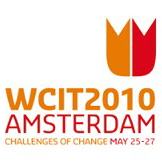3) Improve the quality of life and enhance trust and confidence
Significantly improving the quality of life and enhancing trust and confidence.

As ICT becomes more pervasive and private and public services are increasingly delivered over the internet, access for all to ICT is becoming a social and economic necessity.
The internet must be available and accessible at affordable prices to everyone, including those with disabilities. As many people as possible must become fully digitally literate. Furthermore, high quality healthcare and efficient public services are important factors for a good quality of life across the globe. Intelligent and innovative use of ICT can make healthcare and public services more efficient and more personal.
Trust and security are the foundations on which our economic and social lives are built. Use of the internet may be hampered, however, by the lack of confidence and trust among citizens who may feel that their rights are not as well protected as in more traditional forms of communication. Cybercrime, data loss and privacy breaches bring uncertainty and undermine trust and confidence in the virtual world.
To address these issues, the following actions are proposed:
- Governments should consider introducing a universal right of access to the internet.
- Governments should support policies that enable fair and effective competition between providers of ICT products and services, with the goal of encouraging high availability and use of these items at affordable prices.
- Governments are encouraged to work closely with the ICT industry and use all the means at their disposal, such as projects, procurement and legislation, to achieve ICT accessibility for all user groups and communities, including the elderly and people with disabilities.
- Governments, the ICT industry and other stakeholders should work closely together to develop and implement substantial awareness, education and training programmes. These should be incorporated into educational systems to reach both children and adults with the aim of achieving a globally digitally literate population by 2020.
- Governments should recognise that public spending on ICT for health can make healthcare more efficient, effective and sustainable. This empowers patients and triggers innovation. They should commit themselves to fostering the opportunities ICT offers for health and stimulate the use of common eHealth standards and cross-border data exchange.
- The ICT industry should cooperate closely with housing authorities and homecare providers to empower elderly people to live longer independently and be active in society. The same attention should be given to the delivery of formal and informal quality care. They should encourage the relevant authorities and insurers to address any administrative or institutional barriers.
- Governments should commit themselves to transparent government services and provide online access for citizens and businesses to the relevant information and eGovernment facilities.
- Governments should involve their citizens, including young people, who can be considered to be digital natives, in their policy making.
- Governments, working closely with the ICT industry and other stakeholders, should develop by 2012 a charter of citizens’ and consumers’ rights and responsibilities in the digital environment. This should focus on transparency, trust, security and privacy.
- Governments, businesses and civil society should work closely together to ensure that trust, security and privacy are as fully safeguarded on the internet as they are in the real world.
- European governments should agree to sign the Council of Europe’s Cybercrime Convention, which entered into force in 2004. Future international agreements on action to combat cybercrime should use this convention as a basis.